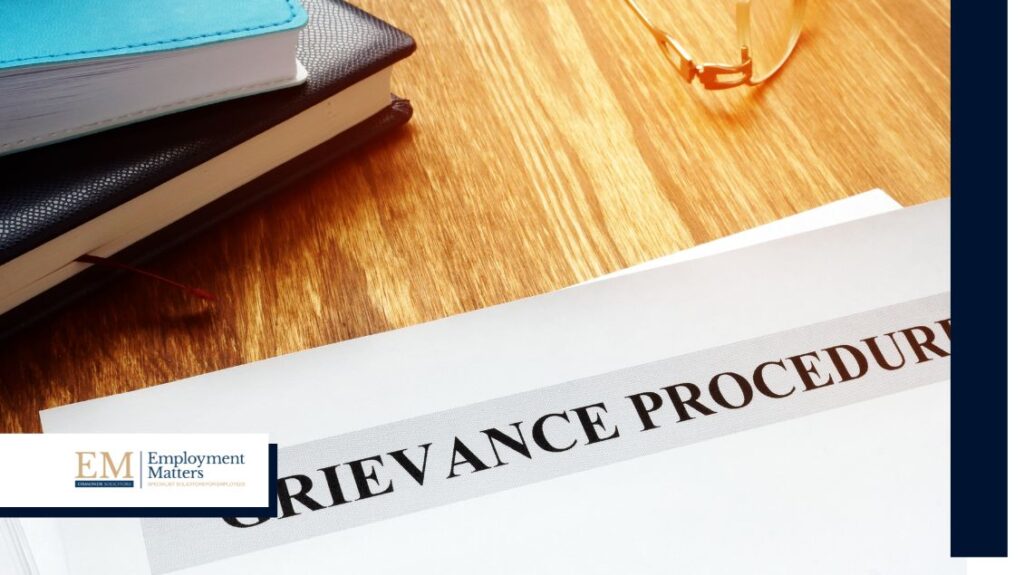A formal approach for an employee to bring up a concern or make a complaint to their employer is through a grievance procedure. What makes this significant now? It enables a transparent, reasonable, and equal approach to settling potential workplace conflicts, fostering a productive work environment.
Importance of a Grievance Procedure
A dedication to a civil and courteous workplace is shown by installing a grievance procedure. It promotes improved communication and, eventually, higher productivity by helping to increase trust and transparency between staff and management.
Key Components of the Grievance Procedure
The Written Statement
A grievance procedure usually starts with the aggrieved employee submitting a written statement detailing their complaint. It’s the first formal step in the process and sets the tone for subsequent proceedings.
Informal Resolution
Grievances are frequently amenable to informal resolution through discussion and mediation. This phase tries to reach an amicable resolution to the problem, saving time and resources for all sides.
Formal Procedure
Grievance Meeting
A formal grievance meeting is scheduled if the issue cannot be resolved informally. The employee presents their case here, and both parties seek a resolution.
Appeal Process
Employees who are unhappy with resolving their grievance have the right to appeal. The appeals procedure offers a second chance to reach a decision.
Legal Aspects of the Grievance Procedure
Code of Practice on Grievance and Disciplinary Procedures
The Industrial Relations Act of 1990 in Ireland establishes a Code of Practice on Disciplinary and Grievance Procedures. This code specifies best practices to guarantee an impartial grievance procedure.
Role of the Workplace Relations Commission
The Workplace Relations Commission (WRC) is a key player in resolving workplace grievances. It provides advice and mediation services to help settle disputes.
The Impact of a Fair Grievance Procedure
On Employees
A fair grievance procedure can boost employee morale and job satisfaction. It assures employees that their concerns are taken seriously and can be addressed without fear of reprisal.
On Employers
It helps employers maintain a positive working environment, reduces turnover, and safeguards against potential legal issues.
Best Practices in Handling Grievances
Preparing for the Grievance Meeting
Preparation is the key to a productive grievance meeting. This entails comprehending the grievance document, familiarising with the pertinent corporate policies, and learning about potential legal repercussions.
Investigating the Grievance
Next, carry out a complete and objective investigation. To fully understand the problem, assemble all essential evidence and speak with pertinent stakeholders.
Communicating the Outcome
Once a decision has been made, communicate it promptly to the employee. Ensure the decision, along with the reasons behind it, is clearly understood.
Handling the Appeal
If an appeal is lodged, handle it with the same thoroughness and impartiality as the original grievance. Remember, this is a chance to rectify oversights in the initial process.
Conclusion
Any firm operating in Ireland must comprehend and implement a grievance procedure. It not only protects workers’ rights but also contributes to a happy, effective workplace. Employers can guarantee a fair and impartial approach to addressing workplace disputes by abiding by the Code of Practice and using the WRC’s services.
FAQs
The first step usually involves the aggrieved employee submitting a written statement detailing their complaint.
Yes, disputes can frequently be settled amicably through negotiation and mediation.
The WRC provides advice and mediation services to help settle workplace disputes.
It may improve a worker’s sense of purpose and job happiness. For businesses, it promotes a pleasant workplace culture and provides protection from future legal problems.
The same diligence and objectivity that were applied to the first complaint should also be applied to the appeal. It is an opportunity to fix any mistakes made during the original procedure.


